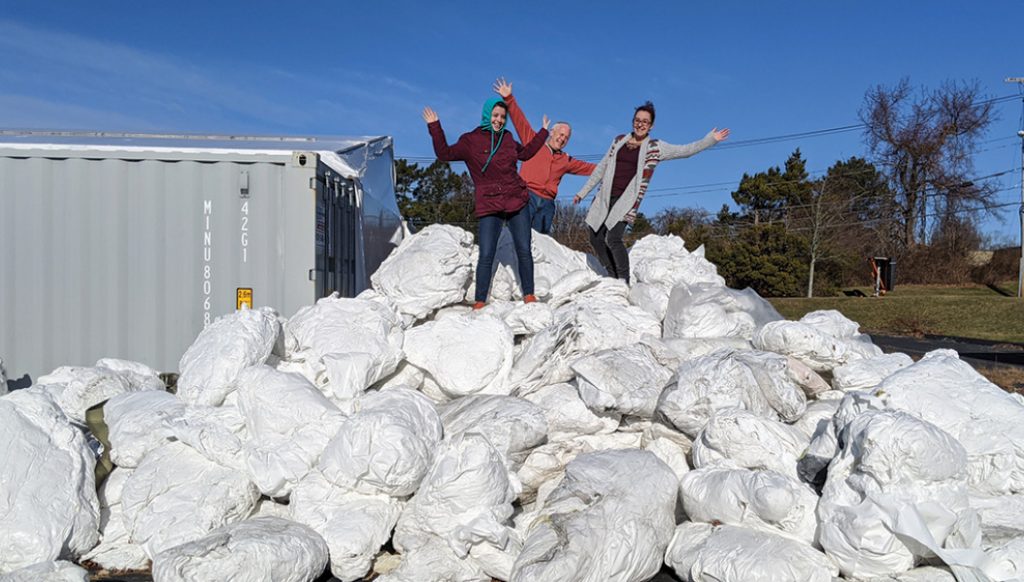By Jamie Rhodes, Clean Ocean Access Shrink Wrap Consultant

Standing atop this pile of soon-to-be-recycled shrink wrap are (l – r) Clean Ocean Access Zero Waste Coordinator Kaitlyn Reed, Executive Director Dave McLaughlin, and Program Director Lauren Dixon. © Jamie Rhodes
If you drove behind the Clean Ocean Access offices in Middletown, Rhode Island over the past six months, the towering mountain of white plastic shrink wrap has been hard to miss. In recent weeks, the skyscraping pile transformed into more than fifty packed bags holding up to 350 pounds each and strapped to some old wooden pallets. This has all been in preparation of sending this plastic on a trip to a plastic recycling facility in Illinois, and its next step towards a second life, perhaps as a compost bin or rain barrel in our community. The urgency to become aware of the lifecycle of materials used in our lives is becoming greater each day since the National Sword Policy was implemented by China in 2017, whereby that nation refuses to accept mixed recycled material from other countries such as the United States of America.
All of this is part of the Clean Ocean Access Plastic Film Recycling Project. Since 2006, the mission of Clean Ocean Access is “Action today so future generations can enjoy ocean activities,” with a primary focus in Newport County. Clean Ocean Access has founding goals to eliminate marine debris (Clean), improve coastal water quality (Ocean), and protect and preserve shoreline access (Access) with a vision of a healthy ocean that is free of marine debris with water that is safe for all ocean activities and a shoreline that is accessible to the public.
As readers of WindCheck well know, every autumn the boating community undertakes hauling their vessels, many of which are shrink wrapped in plastic in order to protect them from ice and the rough New England elements. As an organization committed to understanding and addressing the connection between plastic pollution and ocean health, Clean Ocean Access has been investigating the extent to which this type of plastic, known in the industry as #4 low-density polyethylene (LDPE), is being used across Rhode Island. Of course, knowing how much is out there is of little use, and Clean Ocean Access needed to find out what happens to it after its single-use application.
In exploring what happens to used LDPE, it became clear that there needs to be an intervention. The existing collection and recycling programs need to embrace a circular economic model to mitigate the worst impacts of the rapidly worsening plastic pollution crisis. Most of what is collected is sent to area landfills or incinerators, increasing the demand for more virgin plastic. Since the lifespan of plastic is measured in generations, these single-use applications and disposal through burial or cremation are a poor use of resources that pose a threat to human health and the environment.
The Plastic Film Recycling Project seeks to establish a circular economy for material that is so widely used it’s overlooked. Plastic film is mostly found in the plastic bags and kitchen wrap found in so many homes. However, these regular consumer uses are only the tip of the iceberg in comparison to the massive amount of plastic film being used every day in our economy. This same LDPE is used to wrap the pallets of food delivered to the grocery store, wrap the consumer goods trucked into big box stores, laid on farmers’ fields to prevent weed growth, wrapped around all the cars imported to our shores, and yes, also clinging to countless winterized boats at marinas along our coastline.
Clean Ocean Access is creating an alternative to the currently accepted practice of burn or bury. With the generous support of 11th Hour Racing, Clean Ocean Access started by collecting wrap from a local boat serving company, beginning with scrap material generated by their fall wrapping projects. In a few short months more than 12,000 pounds was amassed in our back parking lot, before anyone knew quite what it would take to find a recycling facility and ship it off-site. Now, with this first load on its way toward a second use, Clean Ocean Access is working out how to collect enough shrink wrap to make a recycling program work on Aquidneck Island and create a circular economy leadership model for the sailing and marine community.
Hopefully, this project will continue to mature and allow more marinas, farms, and importers to have a destination for their plastic wrap, while being assured that they are not further contributing to the environmental problems associated with landfill expansion and operating incinerators. Clean Ocean Access is excited to be able to develop and provide this invaluable service specifically to the boating and sailing community, while further connecting people to the systems in which we must invest to protect our oceans for the next generation. ■
The former Program Director at Upstream Policy and Rhode Island State Director of Clean Water Action, Jamie Rhodes earned a Juris Doctor from Roger Williams University in 2012. He joined the Clean Ocean Access team in 2019. To learn more about Clean Ocean Access, including such volunteer opportunities as beach clean ups and water quality testing, visit cleanoceanaccess.org.



